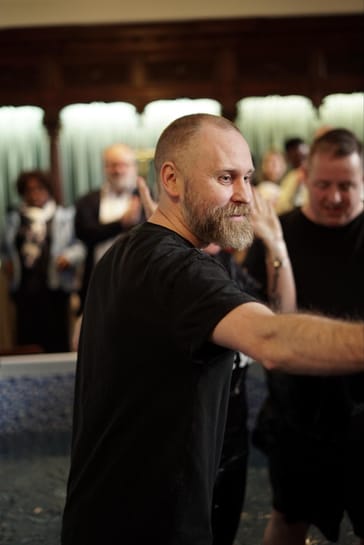9 “Do not get any gold or silver or copper to take with you in your belts— 10 no bag for the journey or extra shirt or sandals or a staff, for the worker is worth his keep. 11 Whatever town or village you enter, search there for some worthy person and stay at their house until you leave. 12 As you enter the home, give it your greeting. 13 If the home is deserving, let your peace rest on it; if it is not, let your peace return to you. 14 If anyone will not welcome you or listen to your words, leave that home or town and shake the dust off your feet. 15 Truly I tell you, it will be more bearable for Sodom and Gomorrah on the day of judgment than for that town.
A few years ago a friend of mine decided to go to France with a friend and just a small amount of money, and to trust in God to open doors for them. He arrived unsure what to do and the lack of resources forced him to immediately start praying and looking for somewhere that he could stay for free. When he returned home, he seemed like a changed man. He told stories of divine interventions, life-changing conversations and miraculous moments. He had trusted God and had experienced a different kind of faith than he had before.
Similarly, I remember a group of older men going on a missions trip to Africa. They were pleasant enough and never caused much fuss at church, often talking about golf and wine. When they returned they spoke about miracles that they hadn’t fully believed were possible. They saw God move in power and it changed them. I sat there wondering how these pleasant, yet low-impact men had changed so much. Why do so many of us not see miracles like they have?
In this passage, Jesus sent his disciples out and before they go, he gives them three specific instructions. First, to take no provisions and to allow the people they are going to serve to provide for them. Second, to find a person of peace who will open doors and help them to achieve their purposes. Third, to only stay where they are welcome and to leave with no resentment or anger when they are not wanted.
These activities may seem incredibly strange/challenging to us because no one acts like this in our culture. However, In Israel there were plenty of people who would go from town to town without possessions, expecting locals to cover their expenses and provide for them. They were called rabbis, the spiritual teachers of the time. His disciples, young men barely out of school, were sent out and told to see themselves as spiritual teachers, helping others to find and follow God.
Jesus is sending us too. We are ‘sent ones’ in our streets, neighbourhoods, our schools and work places. And he has opportunities for us to step into, if we are willing to. So how can we live more like sent-ones?
- Identity. We should see ourselves as ’sent-ones.’ Just like the disciples, who Jesus sent us to a place with a specific goal and so looked at the world through the eyes of people on mission, we are sent to our neighbourhoods and workplaces.
- Dependance. Our lack of resources is our strength. It forced the disciples to look beyond themselves for answers. They knew they would be provided for. When we step beyond ourselves we start to rely on God.
- Trust. We must trust the Holy Spirit to lead us. If somewhere didn’t work out it was because they were meant to be somewhere else. They knew there would be opportunity. God is leading you and will make opportunities for you.
Reflect
- How would seeing yourself as a ‘sent-one’ change how you live your life?
- How does your wealth and ability affect your dependance on God and others?
- How could you better see the opportunities that the Holy Spirit is leading you to?
Respond
Pause and breathe. Pray that God would change how you see yourself, your situation and your relationships. Pray for humble dependence on him and opportunities to bless others and share his love.


